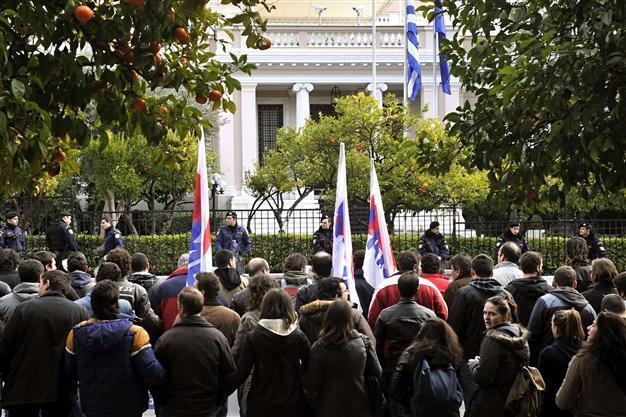Athens strikes debt deal despite fury on the street
ATHENS

Greek communist-affiliated PAME union protesters demonstrate outside the Greek Prime Minister's office in Athens against the governmental coalition and the austerity measures on February 4, 2012. AFP photo
Stock markets soared and the euro struck a two-month high against the U.S. dollar yesterday after it was announced Greek politicians had agreed to an austerity deal.
However, Greek public opinion remains firmly against such austerity, and the burning of the
German flag during a Feb. 8 evening demonstration in front of the Parliament in Athens showed that things could become far worse.
Greek Prime Minister Lucas Papademos and his coalition partners have struck a deal on new cuts demanded by creditors.
Stock markets soared and the euro struck a two-month high against the U.S. dollar yesterday after it was announced Greek politicians had agreed to an austerity deal.
However, Greek public opinion remains firmly against such austerity, and the burning of the German flag during a Feb. 8 evening demonstration in front of the Parliament in Athens showed that things could become far worse.
Greek Prime Minister Lucas Papademos and his coalition partners have struck a deal on new cuts demanded by creditors to secure a vital 130-billion-euro bailout, the Associated Press reported. A spokeswoman for the prime minister’s office said the agreement with the majority Socialists and the conservatives would allow alternative cuts to those rejected early yesterday during a meeting of the three coalition party leaders.
Although all the other cuts demanded by
Greece’s eurozone partners and the International Monetary Fund (IMF) were approved, party leaders had balked at new pension cuts.
However, anger flared on the streets of Athens on Feb. 8 as more than 20,000 protesters marched through the Greek capital. Several hundred protesters clashed with riot police outside Parliament and set fire to a German flag.
“They are committing a crime against the country. They are driving wage-earners into poverty and wiping out pensioners and the unemployed,” AP quoted Vangelis Moutafis, a senior member of the GSEE labor union, as saying. “They are selling off state assets for nothing.”
New general strikeGreece’s two major labor unions also called a 48-hour strike for today and Feb. 11 against the new austerity measures.
“The painful measures that create misery for the youth, the unemployed and pensioners do not leave us much room,” the secretary-general of the ADEDY union, Ilias Iliopoulos, told Reuters. “We won’t accept them. There will be a social uprising.”
European Central Bank (ECB) chief Mario Draghi has declined to clarify whether the bank is willing to contribute to a new Greek bailout by foregoing profits on government bonds it holds. That step could help eurozone leaders find more money for Greece’s second bailout. “I cannot say anything about how our holdings of Greek bonds ... would be treated,” Draghi said.
Panos Beglitis, spokesman for PASOK, which is in the Greek coalition along with the far-right LAOS and the conservative New Democracy party, said the leaders had agreed to cut the minimum wage by 22 percent. Plans to scrap holiday bonuses paid to private sector workers, however, were dropped.
Two sources said the government would promise spending cuts and tax rises worth 13 billion euros from 2012 to 2015, almost double the 7 billion euros originally pledged.
Other elements of the deal have been gradually slotting into place, including the bond swap with private creditors to ease Greece’s debt burden by reducing the value of government bonds held by banks and insurers.
Private bondholders are expected to take real losses of about 70 percent on their holdings as part of the swap, under which they receive new, longer-dated Greek bonds to try to reduce Greece’s debt burden by about 100 billion euros.
